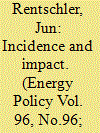|
|
|
Sort Order |
|
|
|
Items / Page
|
|
|
|
|
|
|
| Srl | Item |
| 1 |
ID:
149979


|
|
|
|
|
| Summary/Abstract |
With over 200 countries reaching an agreement with the stated aim of restricting global warming to “well below 2° C above pre-industrial levels” – the most comprehensive climate change agreement was recently signed. Though most of the hard work lies ahead, it marks an important first step for the collective global community to address climate change. Fossil fuels continue to remain one of the largest contributors to greenhouse gas emissions and for many developing countries high levels fossil fuels continues to enable an overconsumption of fossil fuels. Given the sensitivity of governments to subsidy reforms, this study examines the household welfare implications of the removal of fossil fuel subsidies. It finds that while welfare implications are unambiguously positive for government the results are mixed for private households, although in an overwhelming majority of cases, the results are positive. However, even in the cases where the welfare implications are negative for private households we find that it is possible for governments to carry out the reforms in such a way as to be welfare improving to households incomes by compensating them with some of the fiscal savings gained from the subsidy reform.
|
|
|
|
|
|
|
|
|
|
|
|
|
|
|
|
| 2 |
ID:
162910


|
|
|
|
|
| Summary/Abstract |
There is growing consensus on the fact that fossil fuel subsidies provided by governments in high-income countries represent a misalignment on emissions’ reduction with the global climate agenda. In addition, a discussion emerged on the negative socio-economic and environmental externalities associated with fossil fuel subsidies. Nevertheless, pathways for phasing out fossil fuel subsidies in high income countries and their implications on the low-carbon transition have not yet been assessed. With the aim to narrow this knowledge gap, we extend the EIRIN Stock-Flow Consistent behavioral model to study the implications on sustainable development of the gradual phasing out of fossil fuels subsidies, whose revenues could be used by the government to subsidize energy investments in green capital (e.g. solar panels), either via fiscal policies or green bonds. We assess the effects on green growth, employment, credit and bonds market, as well as the distributive effects across heterogeneous households and sectors. A smooth phasing out of fossil fuels subsidies contributes to improve macroeconomic performance, to decrease inequality and helps the government to find fiscal space to support stable renewable energy policies. Renewable energy subsidies contribute to foster the low-carbon transition but could imply distributive effects, depending on the way in which they are implemented.
|
|
|
|
|
|
|
|
|
|
|
|
|
|
|
|
| 3 |
ID:
149977


|
|
|
|
|
| Summary/Abstract |
Since fossil fuel subsidy reforms can induce significant distributional shifts and price shocks, effective compensation and social protection programs are crucial. Based on the statistical simulation model by Araar and Verme (2012), this study estimates the regional variability of direct welfare effects of removing fuel subsidies in Nigeria. Uncompensated subsidy removal is estimated to increase the national poverty rate by 3–4% on average. However, uniform cash compensation that appears effective at the national average, is found to fail to mitigate price shocks in 16 of 37 states – thus putting livelihoods (and public support for reforms) at risk. States that are estimated to incur the largest welfare shocks, coincide with hotspots of civil unrest following Nigeria's 2012 subsidy reform attempt. The study illustrates how regionally disaggregated compensation can be revenue neutral, and maintain or reduce pre-reform poverty rates in all states. Overall, it highlights the importance of understanding differences in vulnerability, and designing tailored social protection schemes which ensure public support for subsidy reforms.
|
|
|
|
|
|
|
|
|
|
|
|
|
|
|
|
| 4 |
ID:
128450


|
|
|
|
|
| Publication |
2014.
|
| Summary/Abstract |
It is often argued that fossil fuel subsidies hamper the transition towards a sustainable energy supply as they incentivize wasteful consumption. We assess implications of a subsidy phase-out for the mitigation of climate change and the low-carbon transformation of the energy system, using the global energy-economy model REMIND. We compare our results with those obtained by the International Energy Agency (based on the World Energy Model) and by the Organization for Economic Co-Operation and Development (OECD-Model ENV-Linkages), providing the long-term perspective of an intertemporal optimization model. The results are analyzed in the two dimensions of subsidy phase-out and climate policy scenarios. We confirm short-term benefits of phasing-out fossil fuel subsidies as found in prior studies. However, these benefits are only sustained to a small extent in the long term, if dedicated climate policies are weak or nonexistent. Most remarkably we find that a removal of fossil fuel subsidies, if not complemented by other policies, can slow down a global transition towards a renewable based energy system. The reason is that world market prices for fossil fuels may drop due to a removal of subsidies. Thus, low carbon alternatives would encounter comparative disadvantages.
|
|
|
|
|
|
|
|
|
|
|
|
|
|
|
|
| 5 |
ID:
161838


|
|
|
|
|
| Summary/Abstract |
An important environmental consequence of subsidies for fossil fuels is that it encourages the substitution from renewable energy, capital and labor to fossil fuels, and thus impedes the low carbon transition. To reduce energy consumption and energy-related greenhouse gas emissions, there is a renewed interest in phasing out fossil fuel subsidies. In policy debates, it is commonly believed that fossil fuel subsidies encourage wasteful energy consuming, and thus removing them would depress energy-related carbon dioxide (CO2) emissions. But whether it is the real case and the magnitude of mitigation by removing fossil fuel subsidies are still unanswered. Here we provide an opposite insight in this paper. We find that fossil fuel subsidies in China might have been removed in total in 2015, but further attention should be paid to whether the removal is caused by the market condition of low energy prices, or by the on-going market-oriented reforms. Furthermore, during the periods with positive subsidies, removing fossil fuel subsidies alone cannot achieve CO2 mitigation because it would lead to the substitution from low-emitted fuels to high-emitted coal and from capital and labor to energy. Our results demonstrate that additional policies and efforts will be required to fulfill the aspirations for low carbon economy. The findings in this paper may be extended to emerging and developing countries due to their similar conditions of fossil fuel subsidies.
|
|
|
|
|
|
|
|
|
|
|
|
|
|
|
|
| 6 |
ID:
121294


|
|
|
|
|
| Publication |
2013.
|
| Summary/Abstract |
Governments spend hundreds of billions of dollars annually to subsidize the consumption of fossil fuels without understanding the environmental and economic problems this practice creates. To shed light on these problems, we examine the case of gasoline subsidies using data on gasoline prices in 137 countries for the years 2002-2009. It is useful to study gasoline pricing because gasoline is the most important transportation fuel, and there are data for many countries for the time period of investigation. We find that major oil producers subsidize gasoline consumption by artificially reducing prices; countries with weak institutional capacity also seem to subsidize gasoline, but the effects are weaker. These results suggest that policy interventions to improve institutional capacity could help developing countries in particular reduce their fossil fuel subsidies.
|
|
|
|
|
|
|
|
|
|
|
|
|
|
|
|
|
|
|
|
|